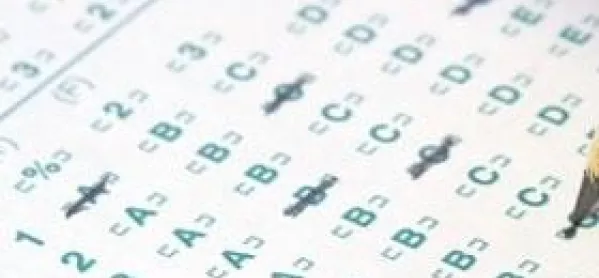Pupils’ progress, not exams, is what matters

The Scottish Government has denied claims it plans to introduce national tests for P7 pupils in literacy and numeracy.
It was forced to clarify its position following reports that all P7 pupils would be tested, with those failing to hit the mark running the risk of being held back. The Government said it would be setting national targets in reading, writing and arithmetic which were more rigorous than at present. But, as one adviser put it, there would be “no external examination, with children gathering in gym halls”.
The most appropriate time to set targets had yet to be decided. Ultimately, a Government spokesperson said, it would be up to the experts whether assessment came in P7 or at other points in a child’s primary career. National monitoring of pupils’ progress would also be changing, she said.
The Scottish Survey of Achievement was being redesigned to provide much more information about young people’s literacy and numeracy skills - but at this stage, the Government could give no indication of what the new regime would look like, added the spokeswoman.
Education Secretary Fiona Hyslop said: “Pupils, parents and teachers need reliable information about a pupil’s progress in developing literacy and numeracy to ensure young people leave school with these essential skills.
“This requires a robust assessment system based on clear nationally-agreed benchmarks. Contrary to media coverage, that does not mean an external exam in P7. The Curriculum for Excellence management board will be considering how best to achieve assessment of literacy and numeracy and will provide me with further advice in due course.”
Widespread confusion over the Government’s position on primary testing arose after last Wednesday’s national qualifications debate in the Scottish Parliament. A number of politicians voiced the fear that literacy and numeracy examinations, planned for S3 or S4, would be “too little, too late”.
When it came to the vote, MSPs from all political parties supported a Conservative amendment stating that Scottish pupils should be “properly schooled and tested in the basic skills of literacy and numeracy by the end of Primary 7”.
According to Liz Smith, Conservative spokeswoman on children, schools and skills, the politicians had backed a plan that would see all pupils in P7 taking tests, set by their teachers in accordance with national targets. In “a few extreme cases”, she said, the results could be used to hold children back. “When pupils move from primary to secondary, we should be clear about their ability. That is not the case just now.”
Teaching unions reacted angrily to the proposals. Greg Dempster, general secretary of the Association of Headteachers and Deputes in Scotland, argued that an exam in P7 would do nothing to tackle literacy and numeracy problems, which would be better dealt with as early as possible.
The Educational Institute of Scotland said P7 testing would set Scottish education back 20 years and ran counter to the principles of A Curriculum for Excellence.
The SNP administration, however, insisted that it had only agreed that literacy and numeracy should be properly assessed over the course of primary.
Labour’s education spokeswoman, Rhona Brankin, felt that the rhetoric following the debate bore “little resemblance” to the Conservative proposal. “Labour wants to see early diagnostic assessment of children ensuring that help is provided to those who are struggling, rather than what appears to be a testing system at age 10,” she said.
Competing priorities in schools - not a lack of testing - means the key skills of reading and writing increasingly fall by the wayside, according to one Scottish literacy commentator, Judith Gillespie.
Enterprise education, healthy living policies and bids to create confident individuals all conspire to compromise children’s chances of leaving school functionally literate, according to Mrs Gillespie, chair of Scottish Labour’s literacy commission and development manager of the Scottish Parent Teacher Council: “To overcome poor literacy there has to be a national effort and it has to be everybody’s priority.”
West Dunbartonshire’s literacy project had been successful, she argued, because of the clear priority given to reading and writing. “All the testing in the world will do nothing except reveal the problem, and that’s not the issue,” she said. “The trouble is, we find out that some kid’s not reading as well as they should be, but don’t put in place steps to put that right.”
TESTING, TESTING .
East Renfrewshire Council claims its extensive testing regime throughout primary, beginning with a baseline in P1, allows it to build up a picture of each child’s ability and tailor his or her learning. “There is a feeling that national testing is not rigorous enough,” said a spokesman.
Glasgow City Council plans to create its own diagnostic testing system for individual pupils. The 5-14 assessment system did not tell councils enough, it felt.
Aberdeenshire Council carries out a baseline test of pupils entering P1, using NFER-Nelson’s Early Years Easy Screen. The information gathered is then used to distribute additional support. Beyond P1, it is up to schools and teachers how they assess literacy and numeracy. But the authority would welcome robust national targets that could be locally delivered, Laura Mason, head of education, said.
North Lanarkshire also uses baseline assessment to check on reading, writing and maths in P1, with further standardised assessments in P3 and P7. Teachers in schools administer the tests, with 5-14 assessments also undertaken when the teacher feels the pupil is ready.
South Lanarkshire pupils take national assessments in the three basic subjects when teachers judge they are ready. “Pupil results are recorded, which allows heads to track pupil progress,” said a spokesman. “On transition from primary to secondary, information is transferred ensuring that the secondary has information regarding pupil’s attainment in mathematics and language.”
Keep reading for just £1 per month
You've reached your limit of free articles this month. Subscribe for £1 per month for three months and get:
- Unlimited access to all Tes magazine content
- Exclusive subscriber-only stories
- Award-winning email newsletters



